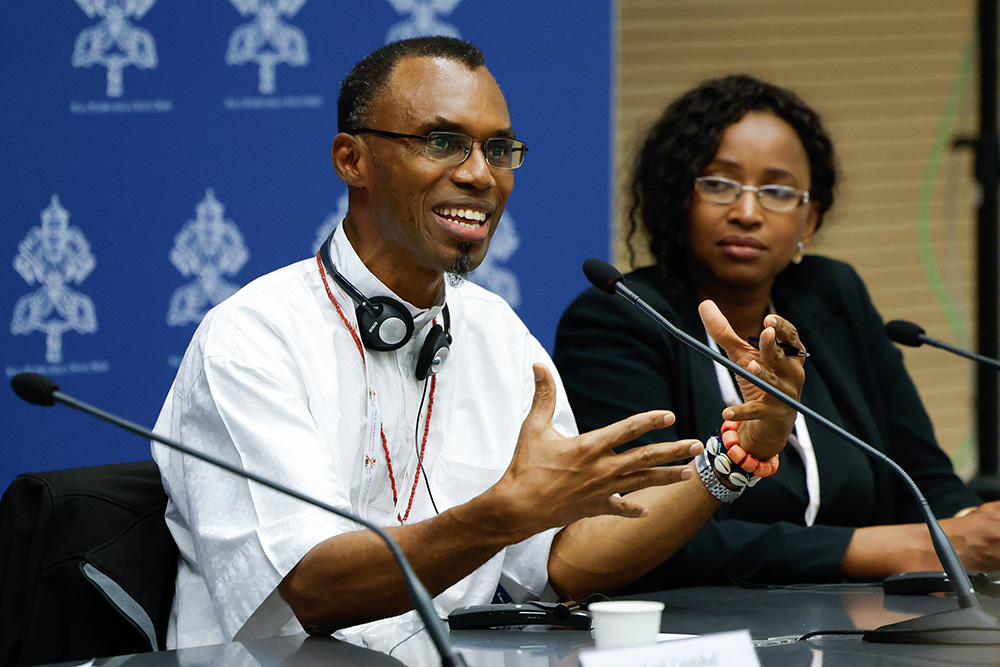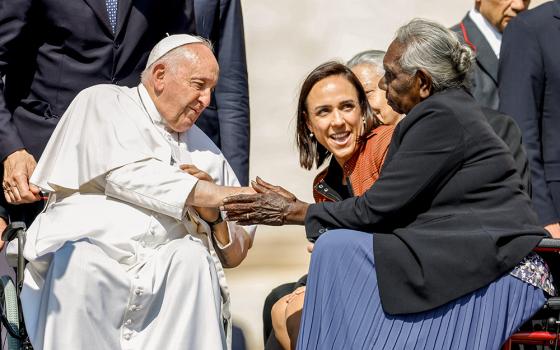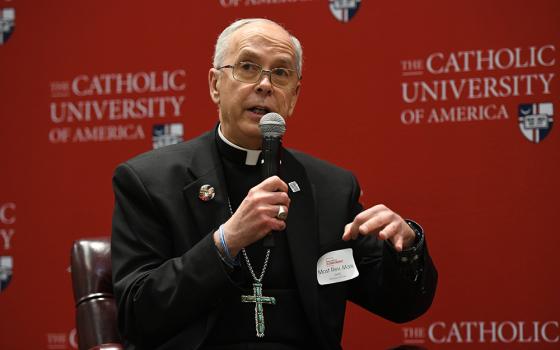
Jesuit Fr. Agbonkhianmeghe Orobator, dean of the Jesuit School of Theology at Santa Clara University in California, speaks during a briefing about the assembly of the Synod of Bishops at the Vatican Oct. 17. Sheila Leocádia Pires, secretary of the synod's information commission, looks on. (CNS/Lola Gomez)
Although the final document for Pope Francis' summit on the future of the Catholic Church did not mention better inclusion of the faith's LGBTQ members, it also made sure that "no issue is finalized" ahead of the next assembly in 2024, said one of the leading African voices at the monthlong gathering.
In an exclusive interview with NCR, Jesuit Fr. Agbonkhianmeghe Orobator said he was reassured that, in the final text from the Oct. 4-29 Synod of Bishops, "the space is there to continue to have this conversation."
"Nothing is closed," said Orobator, a former president of the Jesuit conference of Africa and Madagascar. "It's clear that there is no issue that is off the table. And therefore, even now, because this document is not a final document ... no issue is finalized or closed."
Orobator, who took part in the synod as one of 10 non-bishop members from the African continent, spoke to NCR as part of The Vatican Briefing podcast. The Jesuit, who now serves as the dean of the Jesuit School of Theology of Santa Clara University, also addressed the final document's postponement of action on the possibility of ordaining women as deacons.
"As with other issues that remain open, I believe that what the desires and expectations are were clearly articulated," said Orobator. "Because the document doesn't make decisions on these issues, it attempts to pull together all the divergent positions. But I think that, going forward ... there is nothing in the document that restricts conversations about this matter."
In terms of women's leadership and governance in the church, the Jesuit added: "One of the things I experienced was this desire that we cannot simply continue to ... kick the can down the road. We have to engage with it. I think the moment is now."
Advertisement
Orobator spoke for an episode of The Vatican Briefing podcast that also features Helena Jeppesen-Spuhler, who took part in the October 2023 assembly as part of the first group of women granted full membership and voting rights at the synod.
Jeppesen-Spuhler, who has worked for more than 20 years at the Lenten Fund, the relief organization of Switzerland's Catholic Church, said she found the discussions at the synod on women's leadership "very good and inspiring."
Jeppesen-Spuhler said that at the last synod, held in 2019 to discuss issues facing that nine-nation Amazon region, she had been part of the "Votes for Catholic Women" campaign, led by the Women's Ordination Conference to lobby for women's membership in Catholic synods.
"What I see as a symbol for the future is when we were here in 2019 for the Amazon synod, there was a group of Swiss sisters and sisters from Europe standing in front of the synod office, and we had a small symposium on the right of religious to vote in the synod, because ... it wasn't possible yet," she said.
"In only [four] years after that, the doors of the synod office were open for everybody, and we were able to go there to discuss our issues," said Jeppesen-Spuhler. "This is a symbol for me. Let's open more doors for the women in the Catholic Church."
The episode of The Vatican Briefing featuring NCR's full interviews with Orobator and Jeppesen-Spuhler is available below. You can also subscribe to the podcast on Apple Podcasts, Spotify, or however you listen to podcasts.
How do I listen?
From your computer:
Click the "play" button above to start the show. Make sure to keep the window open on your browser if you're doing other things, or the audio will stop.
From your mobile device:
You can listen and subscribe to "The Vatican Briefing" from any podcast app. If you're reading this from an iPhone or other Apple mobile device, tap this link to listen in Apple Podcasts. The podcast is also available on Spotify, at this link.
If you prefer another podcast app, you can find "The Vatican Briefing" there. (Here's the RSS feed.)
Relevant links for this week's episode:
- Joshua McElwee and Christopher White's joint interview with Chicago Cardinal Blase Cupich and San Diego Cardinal Robert McElroy: Exclusive: Cardinals Cupich, McElroy say 'impossible to go back' to synods without lay voters
- McElwee and White's reporting on the Synod of Bishops' final document: Pope's major Vatican summit ends without action on women deacons, mention of LGBTQ Catholics
- Catholic News Service coverage of Pope Francis' homily at the Mass closing the synod: Pope Francis closes synod with 'dream' of a church with open doors
- Christopher White's reporting on the testimony at the Synod of Bishops about an LGBTQ suicide: Story of LGBTQ youth's suicide led synod delegates to cry, Radcliffe reveals
- Joshua McElwee's 2016 profile of Jesuit Fr. Agbonkhianmeghe Orobator: African Jesuit Fr. Orobator quests for women's inclusion in church structures
- National Catholic Reporter's May 2023 editorial thanking the "Votes for Catholic Women" campaign, led by the Women's Ordination Conference, which advocated for women to be appointed as voting members of the synod: Thank God — and women — for lay voters at the synod







